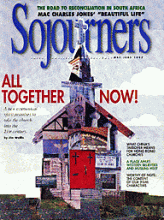The television image of Archbishop Desmond Tutu hugging his former critics and adversaries is a familiar one. Tears and the emotional trauma of mourning, anger, and repentance are now an indelible part of the public image of the South African Truth and Reconciliation Commission (TRC).
Reconciliation, however, is more than sentimentality. It involves more than tears. It is never cheap. It is something that needs to be earned. It can never be assumed. It takes time. This inclines some to balk at the emotional words associated with public apologies. The relatives of those killed in the Bisho massacre in the former Ciskei homeland, however, wept in response to a plea for forgiveness by a colonel responsible for ordering the fatal shooting.
Brigadier Marius Oelschig, the officer commanding the operation, responded differently. When asked whether he regretted the event, he noted that "soldiers do not display emotion in public." "At least Oelschig is consistentand perhaps more honest than some," responded a seasoned journalist listening to his words.
At a subsequent hearing, Brigadier Oupa Gqozo, the former military ruler of the Ciskei, was encouraged by a commissioner to turn and look the survivors and relatives of those killed in Bisho in the eye. He apologized in an emotional scene. Brian Mitchell, the former police officer who planned an attack on United Democratic Front activists at the Trust Feeds settlement in the Natal Midlands, made an impassioned plea for forgiveness, pledging himself to work for the rehabilitation of the community that he had violated. It is important to say mea culpa.
Truth is more important than contrition
Read the Full Article

